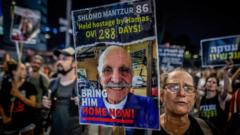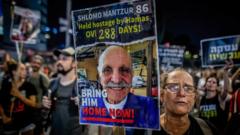In a significant escalation of labor unrest, Starbucks baristas represented by the Workers United union are set to initiate a five-day strike, commencing Friday morning, as they demand better pay and working conditions. Over 11,000 baristas across key cities like Los Angeles, Chicago, and Seattle are mobilizing, with plans to extend the strike to hundreds of stores by Christmas Eve unless negotiations yield results. The union has been pressing Starbucks to enhance wages, improve staffing, and provide better scheduling for employees.
Starbucks Baristas Prepare for Five-Day Strike Amid Wage Dispute

Starbucks Baristas Prepare for Five-Day Strike Amid Wage Dispute
Union representing over 11,000 baristas announces escalating strike actions in major U.S. cities over wages and working conditions.
Starbucks responded to the strike announcement by emphasizing its commitment to negotiations and clarifying that the average pay for baristas exceeds $18 an hour, amounting to approximately $30 per hour when accounting for benefits. However, workers contend that the disparity in compensation between them and high-ranking executives, such as CEO Brian Niccol—a figure earning a base salary of $1.6 million and eligible for bonuses amounting potentially to $30 million per year—is emblematic of broader inequities within the company.
The impending strike arises amidst a backdrop of decreased sales and customer dissatisfaction fueled by recent price hikes and external political factors. Barista Fatemeh Alhadjaboodi articulated the plight of workers, asserting that the decision to strike was a last resort necessitated by Starbucks allegedly failing to uphold its commitments to them.
As negotiations loom, the labor landscape at Starbucks will be closely watched, reflecting broader trends in the hospitality industry regarding workers' rights, compensation, and corporate accountability.
In a climate where employee sentiment is shifting, this dispute could set important precedents for labor relations in large corporations moving forward.
The impending strike arises amidst a backdrop of decreased sales and customer dissatisfaction fueled by recent price hikes and external political factors. Barista Fatemeh Alhadjaboodi articulated the plight of workers, asserting that the decision to strike was a last resort necessitated by Starbucks allegedly failing to uphold its commitments to them.
As negotiations loom, the labor landscape at Starbucks will be closely watched, reflecting broader trends in the hospitality industry regarding workers' rights, compensation, and corporate accountability.
In a climate where employee sentiment is shifting, this dispute could set important precedents for labor relations in large corporations moving forward.





















